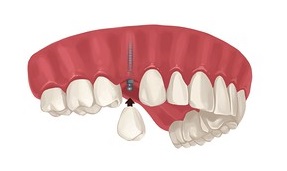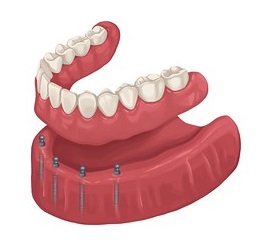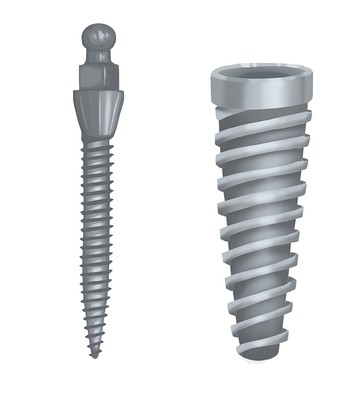Mini dental implants are becoming more popular because they’re cheaper and easier to recover from than traditional implants. However, unlike the traditional ones, they’re usually temporary.
Even so, many people would prefer getting them over dental implants Turkey to avoid the treatment timeline for traditional implants (which can sometimes take about a year). And while there are many pros of the mini implants, there are also some serious cons that you need to consider.
Before undergoing any treatment, it’s important that you know all the details. That will save you both time and money in the long run.
What Are Mini Dental Implants?
Mini dental implants are those with a diameter of 3mm or less. Each consists of a single metal post with a ball-shaped end made from biocompatible titanium.

These kinds of implants don’t always require additional bone grafting and sinus lifting procedures. So, if you’ve lost jawbone mass due to gum disease, tooth decay, injury or osteoporosis, you can still get mini dental implants.
Mini implants are now used to hold dentures, bridges, and crowns. Originally, however, they were designed to help removable dentures (overdentures) stay in place. Now, mini implants can restore more than one missing tooth using a variety of prosthetics.
Who Is A Candidate For Mini Implants?
Mini dental implants are best suited for those who don’t have sufficiently dense bones in the lower jaw and want to get prostheses like dentures, crowns, etc. Since the upper jaw is not as dense as the lower jaw, mini implants can have a higher failure rate there.

Still, they can be used for the upper jawbone as well. Your dentist will recommend a treatment plan depending on the quality (density) of your jawbone.
Other than that, you may consider it the better option if you want to avoid repeat visits to the dental clinic. That’s because it’s possible to get mini implants in just one visit to the dentist. These can be loaded immediately with artificial teeth.
Mini dental implants are also considered suitable for those who have small teeth or want to get restoration with small, narrow openings.
However, they’re more recommended for the front teeth than the back ones. That’s because chewing forces are greater on the back teeth. Too much pressure on these small implants can make them break more easily.
These implants also have a lot of temporary uses. For instance, they’re used for “anchorage” in orthodontics. This essentially stops any unnecessary tooth movement. It’s also used as a transitional implant before the standard implant is fitted.
Contraindications For Mini Implants
You may not be a suitable candidate for mini dental implants if you have:
- Uncontrolled diabetes
- Vascular disease (affecting your blood vessels)
- Blood clotting disorders (Von Willebrand disease, APS, haemophilia, etc.)
- Oral health problems & conditions that affect it
- Bone diseases
- Impaired wound healing
- Bruxism and/or a habit of nail-biting, thumb sucking, etc.
- Not stopped growing (children)
Certain treatments also make you unsuitable for mini implants, such as radio and chemotherapy.
Also, keep in mind that if the jawbone has deteriorated significantly, it doesn’t mean that you can still get mini implants. In this case, you’d need a bone graft.
And lastly, you won’t be a suitable candidate for this treatment if you’re a smoker.
What’s The Procedure For Mini Dental Implants?
To determine your eligibility for mini dental implants, a panoramic X-ray will be required. A diagnostic CT scan might also be required to prepare the treatment plan.
If everything’s good, on the day of the procedure, your dentist will first administer local anaesthesia. That way, you won’t feel any pain during the surgery.
Afterwards, using a small-sized drill, the dentist will drill a small hole into your jawbone. Here, you should know that for standard implants, usually, a flap of gum tissue is first cut to expose the underlying bone. With mini implants though, that may or may not be required.
After the hole is drilled, the axis of the implant is determined and then finally, it’s inserted into its hole. It’s further pushed into the bone using a “ratchet.” Other implants, if needed, are inserted in the same way.
Once that’s done, O-rings are fitted on top of the implants, which help in the retention of the prostheses on top of the implant. These are further modified depending on the type of prosthesis that’s being fitted.
The entire procedure takes about an hour, and you’ll leave the clinic with a restored smile.
How Long Do Mini Dental Implants Take To Heal?
You may need to take a few days off after the mini dental implant surgery to recover. However, the process of the implant fusing with the bone – osseointegration – will take 2-6 months, just like traditional implants
In general though, the recovery time for mini implants is faster because the trauma to the tissue is less compared to standard implants. Additionally, you don’t have to care for any stitches.
Still, you’re likely to experience post-op side effects like pain, bleeding, and swelling. These should resolve on their own after some time.
Your doctor may also prescribe medicines and advise the use of cold compress to manage some of these. You’ll also have to avoid hard, sticky foods for some time, along with smoking.
How Long Do Mini Dental Implants Last?
Truthfully, there’s not enough scientific evidence on the longevity of mini dental implants. They’re supposed to last you a lifetime, though.
According to a study published in the Journal of International Society of Preventive & Community Dentistry, the following factors can affect the survival rate of an implant:
- How old you are
- Length of the implant
- Diameter of the implant
- Quality of your jawbone
- Where the implant is fitted
As far as the diameter is concerned, the researchers observed maximum implant failure when it was less than 3.75mm (mini implants are equal to or less than 3mm).
Other than that, smoking, oral hygiene, general health, and oral habits can also influence how long the implant lasts.
An analysis published in the The Compendium of Continuing Education in Dentistry found that mini implants had a survival rate of 92.1% in 3.5 years. With traditional implants, it’s usually 95% and over a period of 10 years.
How Much Do Mini Dental Implants Cost?
A single mini dental implant can cost you around £1,400 in the UK. This is much lower than a traditional implant, which costs £2,500 on average.
Still, the prices can further vary depending on the complexity of the procedure, type of prosthesis, location of the clinic and the experience of your dentist.
Mini dental implants might be available on the NHS as well. You need to confirm that with your particular NHS Trust, though. In any case, keep in mind that they’re only available on the NHS for medical reasons (not cosmetic).
Since full-mouth restoration with either standard or mini implants can be quite expensive, many people choose to travel to Turkey. There, you can get a standard implant for around £550.
Are Mini Dental Implants As Good As Dental Implants?
Because of their weaker structure, mini dental implants are not as good as regular dental implants. They can snap quite easily, and if that happens, the entire implant will have to be taken out and replaced.

And keep in mind that the extraction isn’t easy either. Remember, the implant integrates with the bone, so taking it out will be difficult.
On the other hand, in traditional implants, there’s an abutment on top. If that breaks, you can unscrew it and put a new one in place, but the actual implant underneath it stays safe.
Another consequence of the small diameter of the mini implants is that they don’t handle pressure well. And for this reason, if the tooth loss is at the back of the mouth, where the chewing forces are greater, you’ll do better with a traditional implant.
Another hassle of mini implants are their O-rings. These O-rings wear out quite easily, and they need to be changed after every 6 months. So, this treatment isn’t exactly just one visit to the dentist.
How Mini Dental Implants Are Different From Regular Implants?
Here’s a summary of the differences between mini and standard dental implants:
| Mini Implants | Traditional Implants | |
| Structure | One titanium screw with a prosthesis on top. No hollow space owing to its diameter | A titanium screw, an abutment, and a prosthesis on top. Hollow space on the inside |
| Diameter | 3mm or less | More than 3mm |
| Visibility | Only the abutment is visible above the gum line, the implant is hidden underneath. | The ball end protrudes from the gum line. |
| Anaesthesia | Local | Local |
| Procedure | Drilling into the jawbone followed by insertion of the implant (may require flap removal). | Cutting a flap of gum tissue to expose the jawbone, drilling a hole into it, placing the implant and stitching the tissue back up. |
| Appointments | 1 (more if bone graft extraction or sinus lifting is required) | 3 (second takes place months later) (more if bone graft, extraction or sinus lifting is required) |
| Downtime | 1-2 days | 1-2 days |
| Results | Permanent (higher risk of implant failure) | Permanent (lower risk of implant failure) |
| Cost | £1,400 in the UK | £2,500 in the UK £550 in Turkey |
It’s important to consult a dental professional before deciding on any treatment. Make sure to discuss the pros and cons of each. Your treatment plan should be prepared depending on your needs and expectations.
Conclusion
Many patients want to get mini dental implants because they’re cheap and allow for faster recovery. However, keep in mind that the structure of this implant is weaker than a traditional implant. So it can break more easily.
They’re better when used as temporary solutions. But depending on the kind of restoration you require, the quality of your bone and your health, you may be suitable for mini implants too.
Whatever may be the case, always consult a board-certified and registered dental professional for an accurate treatment plan.
Reviewed and approved by Dr Izbel Aksit.
